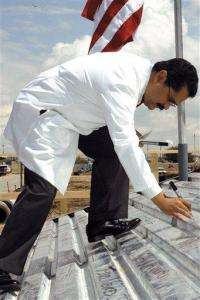Boom amid bust: Med schools grow as economy tanks

(AP) -- You wouldn't know there was an economic crisis the way the medical school business is booming these days.
Responding to warnings of a looming doctor shortage, existing schools are increasing enrollment, and new ones are opening or under development from El Paso in West Texas to Kalamazoo in western Michigan.
Medical school expansion plans are rushing ahead despite the severe economic downturn, even in the battered home of the nation's struggling auto industry.
The reason is quite simple, according to the president-elect of the American Medical Association.
"Americans are living longer, and there are more of them," said Dr. J. James Rohack, a Temple, Texas, cardiologist. "It's clear that the demographics of American society point to the need of having and expanding a well-educated medical work force."
Today, many poor and rural areas already face doctor shortages, and primary care positions go unfilled as doctors gravitate to higher-paying medical specialties. Graduating more doctors doesn't directly address either problem, but is a key part of the answer, medical groups say.
This year alone, the number of accredited medical schools training doctors in the U.S. is set to grow by four to 130. Five others have applied for accreditation from the Liaison Committee on Medical Education, with the aim of accepting students in 2010 or 2011.
Michigan, where unemployment jumped to 11.6 percent in January, could see medical school ranks go from three today to six within a few years.
In the Detroit suburb of Royal Oak, William Beaumont Hospital is collaborating with Oakland University in Rochester on a new medical school that would accept its first class in 2010.
Michigan State University is expanding its medical school programs at a new campus in Grand Rapids, as well as in Detroit and Macomb County's Clinton Township. Central and Western Michigan universities are well along in planning medical schools of their own. Wayne State University has significantly expanded its medical school enrollment, while the University of Michigan has kept its enrollment steady.
Pushing plans for a new medical school even as Michigan's auto-based economy sputters isn't as crazy as it might seem, according to Robert G. Miller, associate vice president at Western Michigan University.
The board at his Kalamazoo school gave the go-ahead for advanced planning on a new medical school in January.
"It's many years out," Miller said. "There's enough support in the community and enough assets to move forward."
Health care in America is a $2.4 trillion annual business, or about $8,000 for each of the nation's 300 million residents. President Barack Obama has made overhauling health care - extending coverage to the 48 million uninsured while fighting rising costs and attacking waste - an early priority of his administration.
A quarter century ago, experts blamed rising health costs on what they said was a surplus of doctors. They said doctors seeking income would perform unneeded procedures, making medical care more expensive. In response, medical schools capped or cut enrollments.
But in recent years, doctors and medical school groups have re-examined the issue of doctor supply and now warn of a large shortfall in coming decades.
The Association of American Medical Colleges said last year that if current demand and supply patterns continue, the U.S. will have about 750,000 doctors by 2025 - about 159,000 fewer than it needs. The shortage will be particularly acute for primary care doctors, the group said.
The medical school group called for stepped up recruiting of minority group students more likely to practice in underserved areas. It also called for adding 1,500 spots each year to the National Health Service Corps, which finances training for medical students who work in underserved areas after graduation.
One area already facing a doctor shortage is El Paso, Texas, where Texas Tech University greets the entering class at the Paul Foster School of Medicine on July 13.
Northerners migrating to the Sun Belt and immigrants arriving from Latin America have driven up demand for doctors, and 30 to 35 percent of El Paso's doctors now are graduates of medical schools outside the U.S., said the school's founding dean, Dr. Jose Manuel de la Rosa.
Also accepting their first entering classes this year are Florida International University in Miami, the University of Central Florida in Orlando and Commonwealth Medical College in Scranton, Pa.
Nationwide, enrollments already are edging up. Accredited schools accepted 18,036 new medical students in 2008, up 9.1 percent from 16,538 in 2003. The number of students applying for admission rose 21.4 percent in that period, from 34,786 to 42,231.
The AMA warns that expanding medical school enrollment leaves another big problem unanswered: Coming up with the $200,000 per year it takes to train new doctors during their three- to seven-year residencies.
The federal Medicare program has financed residencies since 1965, but the government capped the number of positions at about 98,000 in 1997, Rohack said. The actual number of residents has risen since then, with hospitals financing the extra slots through stopgap measures.
"If we can take the cap off ... then American society will be better served," he said. "Most societies that are successful tend to have healthy populations."
©2009 The Associated Press. All rights reserved. This material may not be published, broadcast, rewritten or redistributed.



















